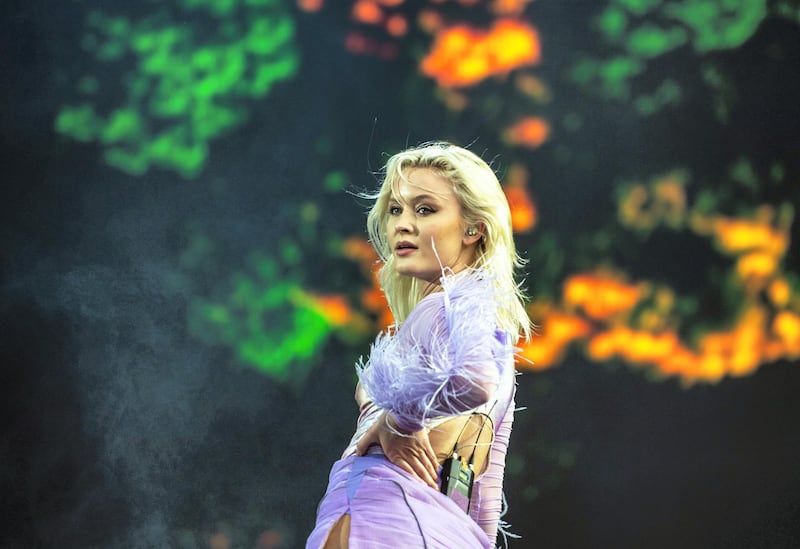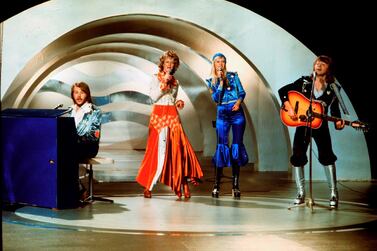Zara Larsson has a confession. "I haven't really been taking care of myself – at all," she confides, unprompted, seconds after we meet. Ten minutes earlier, the Swedish singer was under the spotlights, flanked by 10 tightly choreographed dancers and musicians on stage at Gothenburg's Way Out West festival.
But what I, the 20,000-odd adoring fans and even her own band failed to notice, is that Larsson had to run to the side of the stage to discreetly vomit.
“And I just hid it so well, right?”, she says brightly, like any other 21-year-old woman might announce passing a driving test or bagging a job interview for a bottom-rung admin role.
'I'm not a person of discipline'
Because she has had some practice – already famous for more than half her life – this wasn't the first time Larsson has been forced to make a sudden exit stage right. "When I sleep really bad and I don't eat, I throw up," she says, having slipped out of her feathered ostrich plumes and into a baggy tracksuit since leaving the stage. "I know this happens all the time when I don't take care of myself – and I've been on the road now all summer long and it is very hard. I'm also not a person of discipline when it comes to stuff I think is fun."
She blames, in part, recently getting hooked on Spanish drama series Money Heist. "I just binge watch stuff and lay in bed and eat snacks," she says chirpily.
The Gothenburg show wasn't merely a homecoming for the woman who became a household name at the age of 10 after winning the second season of Talang, the reality TV franchise Got Talent, in 2008. It was also a chance to stretch out and reclaim the spotlight after three months on the road supporting Ed Sheeran. Larsson served as opening act on the 14th and final leg of the record-breaking Divide Tour – recently declared the biggest, most attended and highest-grossing concert run of all time. Rather than the impressive crowds, Larsson will, instead, most remember introducing the world's biggest pop star to her parents.
"Before we went out on the road, we didn't honestly expect to even see [Sheeran] – because it's a big tour, there's just hundreds of people involved and he will be physically far away," she says. "But he's the kind of person who goes out of his way to make sure everyone feels welcome. And I think it's such a special thing – he 'don't need to do that, y'know what I'm saying?'", says Larsson, slipping into an affected Americanised drawl. "He don't."
Meeting her own expectations
Down-to-earth and instantly likeable, one imagines Larsson maintaining the same humility as she gobbles her own ever-fatter slice of the pop spotlight pie – which seems inevitable. Signed at 15, Larsson landed a Swedish number one with debut single Uncover in early 2015. Two years later, she went global with the cloyingly catchy Lush Life – the first of eight singles from what would become her album So Good.
Her first international LP was also preceded by MNEK-collaboration Never Forget You, club banger Ain't My Fault and the intoxicatingly sassy I Would Like – evergreen earworms bouncing between R&B, pop and electro stylings. After barely pausing for a post-Sheeran breath, Larsson kicks off her own US solo headline tour in mid-September, before album No 3, promised "after the summer, for sure this year".
Teased by last year's emotionally masochistic anthem Ruin My Life, expectations are high – not least from the increasingly commanding singer herself.
"I guess I would like for my songs to not necessarily ... I don't know if mature is the right word – I want them to be better," she says with an unnerving frankness. Contrary to rumours, the as-yet-unnamed release is "definitely pop" – not the R&B record many expect – and will be unashamedly autobiographical. "This album is very love-centred because that's just easy and universal," says Larsson. "I would say it's more honest – it's a bit more about my life and I've taken a lot of inspiration from my friends as well, just to write their stories because sometimes my life is very …" she trails off. Unrelatable? "I just work, and I don't really have a lot of drama going on – but my friends do, so …"
'I'm not perfect'
Larsson's lyrics are something she thinks harder about than perhaps many comparable pop acts. A proud feminist who champions progressive politics to her six million Instagram followers, Larsson gained industry respect for altering the originally unenlightened words to Ain't My Fault to reflect the "girl code". The lyrics to the song were originally about two women fighting over a man, but in the new version she addresses him directly, rather than quarreling with another woman. And having previously called out badly behaved stars, she firmly feels her contemporaries should exercise the same diligence.
"I know what it's like to look up to someone and be very influenced by them – you are someone's idol and that means they will do what you do," reflects Larsson. "I'm not perfect, obviously – I do bad [things] – but I try to be a good person.
In my eyes that is being kind to one another, treating people [equally] or fighting for people to be treated equally – feminism is a very big part of who I am."
She says that since celebrities are able to reach a vast amount of people through social media, they are able to promote causes or encourage fans to engage with subjects the artist feels strongly about. "Most of these celebrities have more than 100 million people following them just on Instagram. If they talk to their followers – like, go out and vote, feminism, intersectional feminism – I think that really, really does make a difference.
I’ve always thought my generation can be the generation that can change it all – but the racist people, they’re also having kids, so we’ve really got to go out there and push for it, because it’s not going to happen by itself.”
So what's next?
While we talk, Larsson fiddles distractedly with a bottle top before methodically tearing the label off the electrolyte water bottle she cradles. While she never appears less than focused on the conversation, a restless charge seems to flicker in the back room of her mind. Larsson credits "grit and determination" as the greatest factor in her success, but having known fame now for more than half her years, one senses an insatiable hunger that she self-diagnoses as not entirely healthy – already scarily aware that no level of success will ever be enough.
"It's also down to: what do you want to do in life? I don't want to just chase after some form of success because if that's the only thing you're chasing, I know I'm not going to be happy, ever," says this old-young soul. "I know if I got to the point [of] Ed Sheeran, having all those people coming to my shows, I know a part of me would still not be happy. So chasing that is just not enough."
Larsson explains that she is sometimes questioned if singing is even the right path to follow. "Sometimes I have an existential crisis," she says.
"Y'know what's cool, but also sad? I absolutely expected all of this. And if one day I reach that level of having a stadium tour, which is my dream, I know there's something in me that will be like, 'cool, but what's next?' I'm a very hard-to-satisfy person."






